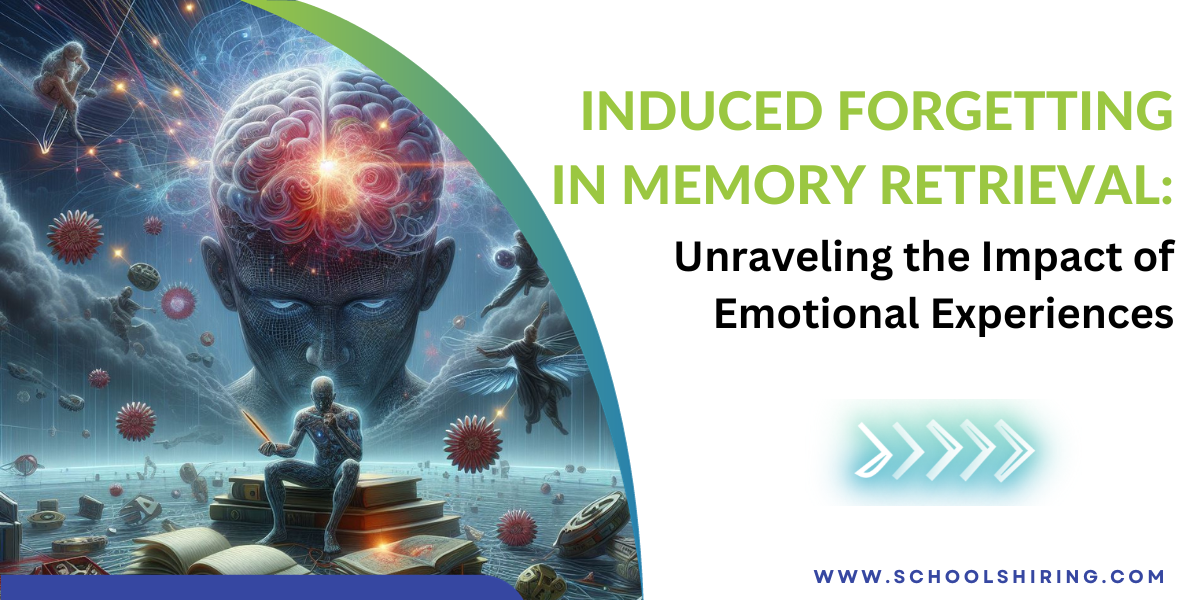
Memory, the intricate tapestry of our past, is not a flawless recorder. Instead, it is a dynamic process influenced by various factors, one of which is induced forgetting. This phenomenon, wherein certain memories are deliberately suppressed or inhibited, has garnered significant attention in the realm of psychology. In particular, the interplay between induced forgetting and emotional experiences has become a captivating area of research.
The Foundations of Memory Retrieval:
Memory retrieval begins with the initial encoding of information during the learning phase. The brain encodes experiences through a network of neurons and synaptic connections, creating a foundation for later retrieval. Emotion, as touched upon earlier, is a potent catalyst in the memory retrieval process. Emotional experiences tend to be more vividly remembered due to the activation of the amygdala, a region of the brain associated with emotional processing. Positive or negative emotions can enhance the salience of a memory, making it more accessible during retrieval. Retrieval cues and contextual information act as guides in navigating the mental maze of memories. The brain relies on these cues—whether they be sights, sounds, smells, or emotions—to trigger the recall of associated information. The context in which a memory is formed and stored can profoundly impact its retrieval, as demonstrated by the phenomenon of context-dependent memory.
The Cognitive Mechanism of Induced Forgetting:
The cognitive mechanism of induced forgetting involves the deliberate inhibition of specific memories through processes like inhibitory control, competition, and interference. The directed forgetting paradigm, neuroimaging studies, and insights into the temporal dynamics contribute to our understanding of how the brain actively shapes the retrieval of memories. Moreover, exploring the impact of emotional experiences on induced forgetting deepens our understanding of the nuanced interplay between cognition and emotion in the realm of memory. The emotional valence of memories—whether they are positive or negative—plays a pivotal role in induced forgetting. Negative emotions, such as fear or anxiety, may trigger a stronger inhibition response, leading to the intentional suppression of memories associated with those emotions. Positive emotions, on the other hand, may enhance the accessibility of associated memories.
Emotional Experiences and Memory Retrieval:
The relationship between emotional experiences and memory retrieval is intricate and multifaceted. Emotions not only enhance memory consolidation but also influence the selective retrieval of memories and play a role in intentional forgetting. Exploring the neural underpinnings of emotional memory and its modulation provides a deeper understanding of the interplay between cognition and emotion, contributing to the broader field of memory research and its applications in various domains, including psychology, neuroscience, and mental health..
The Two Faces of Emotion in Memory:
The two faces of emotion in memory provides a more comprehensive view of how emotional experiences shape our recollections. While emotions often enhance memory and contribute to the formation of enduring memories, the intentional suppression of emotionally charged memories showcases the inhibitory aspect. This dynamic interplay between enhancement and inhibition highlights the complexity of emotional memory processes and their implications for cognitive functioning and psychological well-being.
Selective Forgetting in the Face of Emotional Memories:
The concept of selective forgetting in the face of emotional memories is a rich and multifaceted area of study. It involves considerations of emotional valence, cognitive load, cultural influences, long-term consequences, trauma, age-related changes, therapeutic applications, and ethical considerations. As research continues to unravel the intricacies of selective forgetting, the field stands poised to offer valuable insights into the adaptive nature of memory regulation and its implications for mental health and well-being.
Neural Correlates of Induced Forgetting:
The neural correlates of induced forgetting involve a complex interplay between the prefrontal cortex, hippocampus, amygdala, and broader inhibitory control networks. The temporal dynamics, emotional modulation, and individual differences in neural responses contribute to the multifaceted nature of induced forgetting. As neuroscientific research continues, a more comprehensive understanding of how intentional memory suppression operates at the neural level will likely lead to practical applications in areas such as cognitive interventions and therapeutic strategies.
Implications for Therapy and Everyday Life:
The implications of induced forgetting in therapy and everyday life are far-reaching. From trauma treatment to everyday decision-making, the understanding of intentional memory suppression provides a valuable tool for enhancing mental health, coping strategies, and overall well-being. Integrating this knowledge into therapeutic practices and personal development efforts can contribute to more effective, adaptive, and intentional memory management.
Conclusion:
The interplay between induced forgetting and emotional experiences unveils the intricate mechanisms at play in the labyrinth of memory retrieval. The brain, a masterful curator, sifts through the emotional nuances of our past, delicately choosing which memories to preserve and which to cast into the shadows. As we continue to unravel the mysteries of induced forgetting, we gain a deeper understanding of how emotions sculpt the landscape of our memories, shaping the narratives that define our lives.